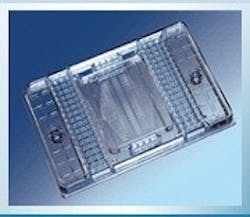Fluidigm Corp.
Fluidigm Corp. recently released the 8.96 Screening Chip, the newest addition to the Topaz System for Protein Crystallization. The 8.96 Chip is the latest in the Topaz X.96 series and delivers the ability to run 768 experiments in parallel with less than 15 nanoliters of protein sample per trial. This higher density of experiments and lower protein consumption, compared to traditional drop-based formats, dramatically reduces the overhead involved with protein crystallization.The 8.96 Chip screens 96 reagents against eight samples, which opens the door to the simultaneous processing of multiple targets. This feature allows researchers to use nano-volume crystallization to qualify which among multiple constructs or protein-ligand preparations are "crystallizable." Researchers use the information to determine how their protein production resources should be allocated. Only qualified targets are scaled up to generate crystals, thus preventing wasted effort in protein production. Until the advent of the 8.96 chip, parallel processing has been impractical because of inefficiencies with traditional platforms."The 8.96 Chip fulfills a promise made with the crystallization community to provide increasingly cost effective and enabling devices" said Gajus Worthington, Fluidigm's CEO. "It is important to note that we are able to provide greater and greater processing power in our Chips while maintaining compatibility with existing Topaz instruments. Performance improvements in the Topaz system are driven by intelligent chip design." For more about Topaz products or to download an application note on parallel processing, please visit Fluidigm's Topaz website (address above).
